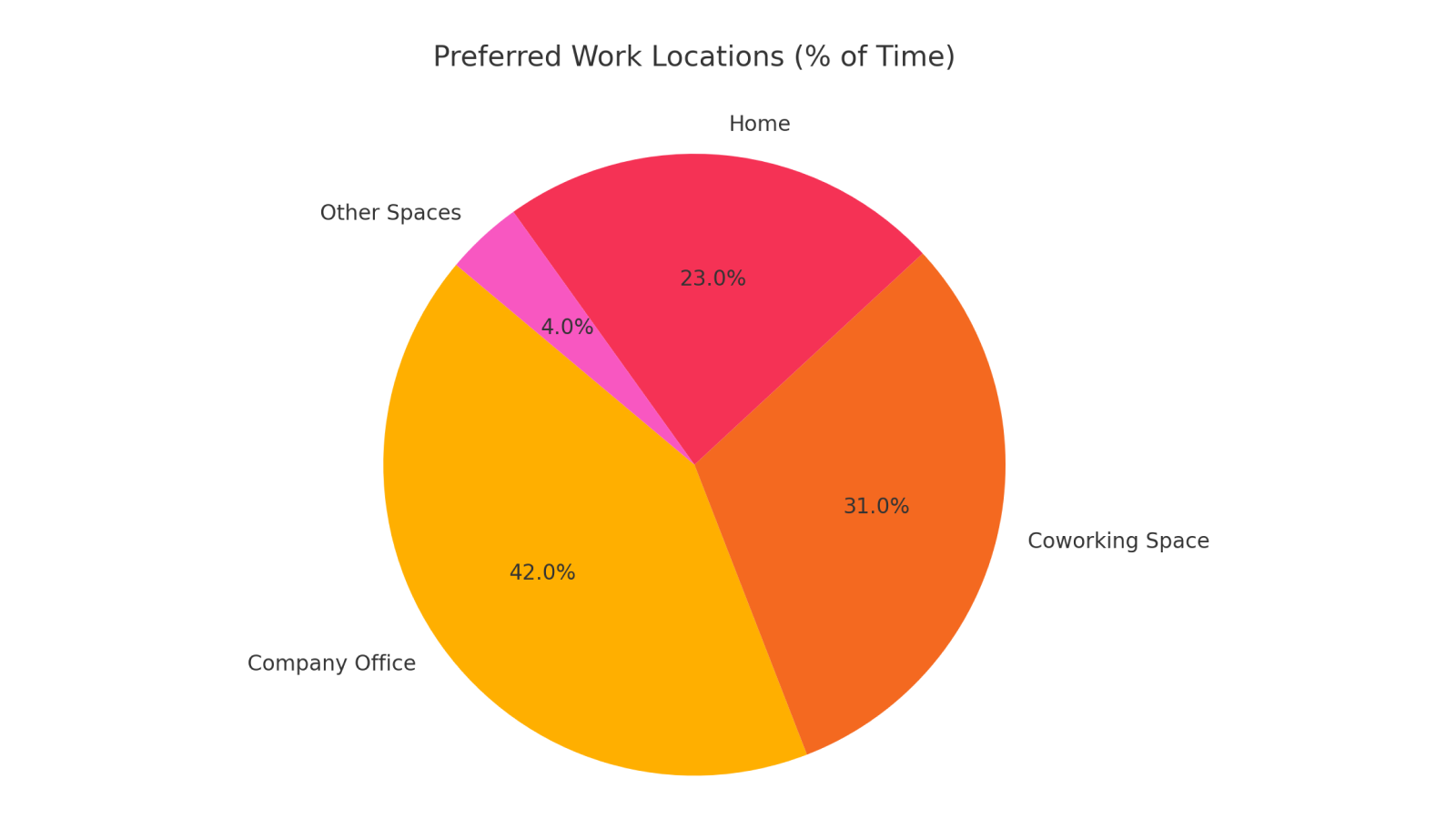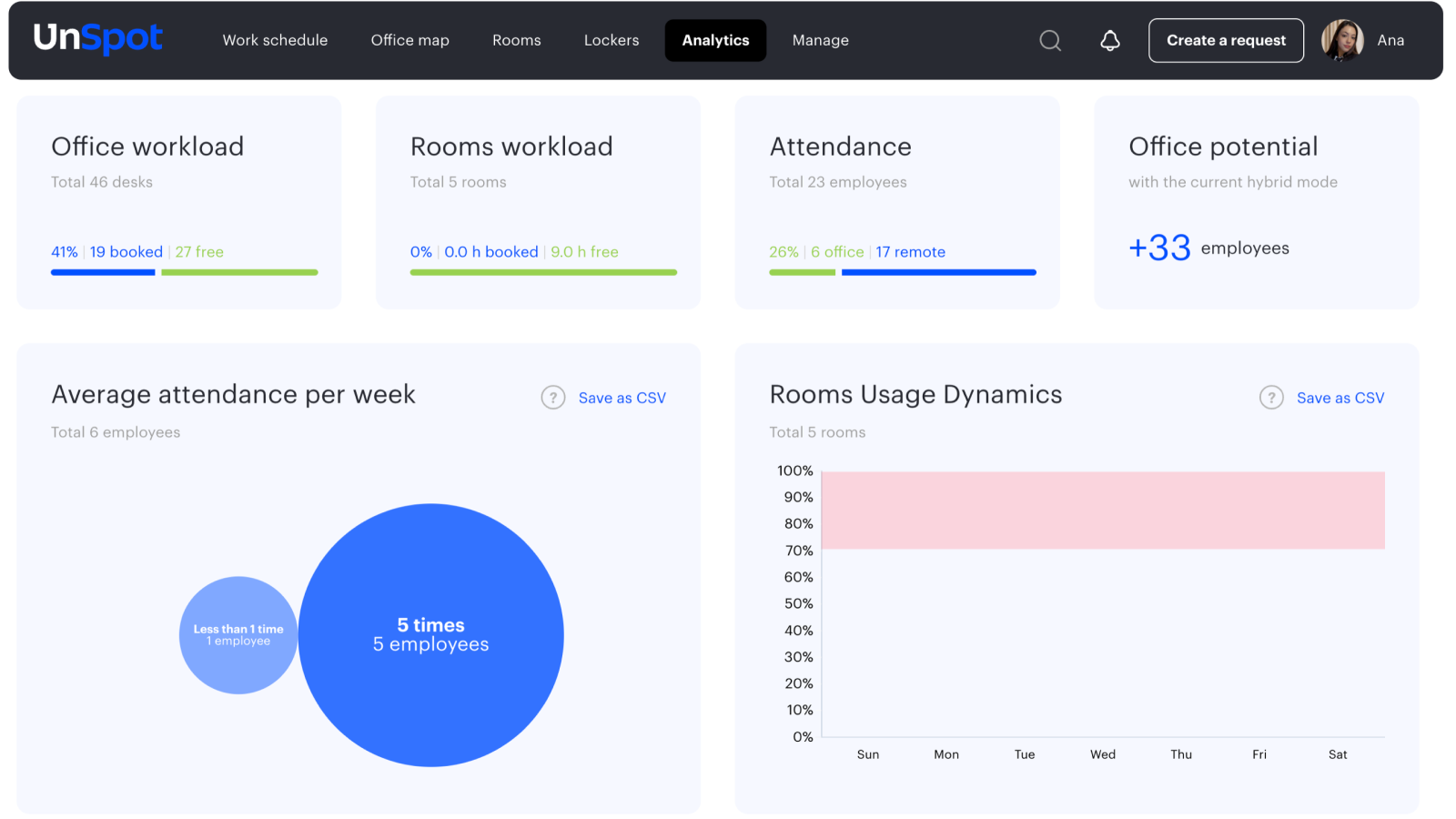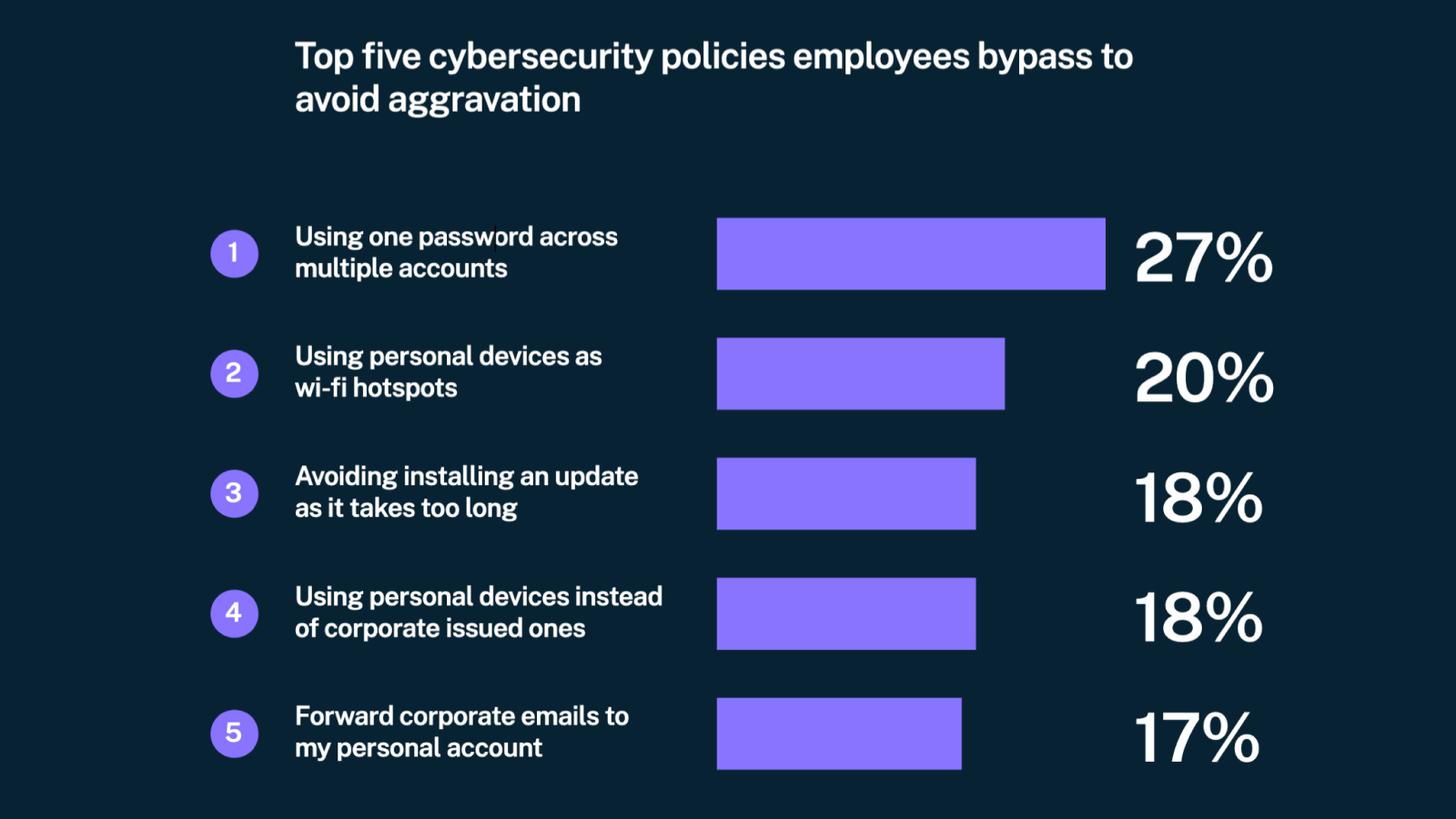The hybrid model is taking the world by storm — according to Nick Bloom, a Stanford University professor and one of the leading experts on the future of work, it's predicted to become the dominant approach to hybrid work arrangements by 2030.
Industry giants like Amazon, JPMorgan, Google, and others are already embracing the hybrid format. To ensure you're not left behind, we've crafted a comprehensive guide suitable for both newcomers and seasoned professionals in blended work ⬇️
Takeaways
- Hybrid work, which combines remote and office formats, is rapidly gaining popularity and is predicted by Stanford professor Nick Bloom to become dominant by 2030.
- Large companies such as Amazon, JPMorgan and Google are already offering hybrid work, giving employees the flexibility to choose where they work.
- There are different types of hybrid models: fixed, prioritizing remote work, flexible, and with office as a priority.
- The benefits of blended working include increased productivity, reduced office costs, talent attraction and improved business agility.
- Despite challenges such as communication gaps and cybersecurity concerns, the right implementation and culture of blended work arrangements helps companies successfully overcome these challenges.
What Is Hybrid Work? Definition and Setting
Hybrid Work Definition
Hybrid work is a model of work organization in which employees combine work from the office and remote work from home or other locations.
In such a system, employees can choose where and when to work based on current tasks and personal preferences, and companies provide the necessary technology and infrastructure to support effective collaboration and team coordination regardless of the employees' location.
Hybrid Work Environment
Hybrid Work involves various aspects of work organization that strike a balance between remote and office work. To fully understand the concept of mixed work model, it is important to understand a few key concepts:
- A Distributed team is a team whose members work from different geographic locations. In the hybrid model, these teams allow companies to attract talent regardless of location.
- A flex employee is an employee with a flexible work schedule who adjusts his or her own working hours and location. In the context of hybrid work, a flex employee can alternate between working from home and going to the office, which promotes a better balance between professional responsibilities and personal life.
- Flex space is an adaptable workspace that changes according to the current needs of the team or individual employees. In mixed work, flex spaces, such as co-working spaces or modular offices, allow workspaces to be quickly reconfigured for meetings or teamwork.
- A Hybrid team is a team made up of employees working both remotely and from the office. This structure allows us to use the advantages of both work formats: the flexibility of remote work and the possibility of personal interaction in the office.
To better understand the features of the blended work model, we present a table comparing it to traditional office and fully remote formats.
| Aspect | Traditional Work | Remote Work | Hybrid Work |
| Work Location | Physical office | Any location with internet access | Combination of office and remote locations |
| Flexibility | Fixed working hours | High flexibility in schedule and location | Moderate flexibility with partial autonomy |
| Communication | In-person meetings and direct interactions | Virtual meetings via online platforms | Mix of in-person and virtual communication |
| Access to Resources | Full access to office infrastructure | Limited to remote tools and resources | Access to both office and remote resources |
| Employee Engagement | High through constant office presence | Potential challenges in maintaining engagement | Enhanced engagement through blended interactions |
Key findings:
- Traditional work provides stability and face-to-face interaction, but limits flexibility and prevents a healthy work life balance.
- Remote work offers a high degree of flexibility and freedom, but can reduce engagement and require high levels of self-organization.
- Hybrid work combines the benefits of both formats, providing a balance between flexibility and structure, and improving employee engagement through combined communication methods.
Types of Hybrid Work Models
The hybrid approach to work continues to gain popularity as employees prefer to spread their working hours between different locations.
Instant Group's research shows that the office remains an important space (42% of the time), but a significant proportion of employees also value flexibility: 31% prefer to work in co-working spaces, 23% at home, and 4% in public places.

Fixed Hybrid Work Model
Hybrid employees work in the office on certain days of the week and remotely on others. The schedule is set by the employer.
Trip.com, a leading online travel agency, implemented a fixed mixed work model where employees work from home two days a week and in the office for the remaining days.
Remote-First Hybrid Model
A remote-first hybrid model is an approach where remote work is the primary format, and physical presence in the office is used only when necessary or desired by the employee.
Blackbaud, a cloud computing provider, adopted a remote-first model, allowing employees to work primarily from home.
Flexible Hybrid Model
Employees choose when to work from the office and when to work remotely, coordinating with management.
Zoom has implemented a flexible work model that allows hybrid and remote employees to choose today's workplace.
Office-Centric Hybrid Model
Employees are required to work in the office on certain days, with limited ability to work remotely.
JPMorgan requires managing directors to be in the office full time and other employees to be in the office three days per week.
Choosing the right hybrid model depends on your company's specifics, culture, and employee needs. Proper implementation of mixed work arrangements contributes to increased efficiency and employee experience.
Benefits of Hybrid Work
📈 Boosting Productivity
Employees often work more effectively in a hybrid setup. Without constant office distractions — like impromptu meetings, hallway chats, and noise — they can focus on important tasks. Office days are used for collaborative work and strategic discussions, enhancing cooperation and innovation.

How to Maximize Results:
- Provide employees the flexibility to choose where and when they work, adapting their work schedules.
- Encourage work-life balance to prevent burnout.
💰 Reducing Office Space Costs
Renting and maintaining office spaces is a significant expense for companies. Many organizations are adopting flexible workstations and shared areas, cutting costs on rent and utilities.
According to Global Workplace Analytics, companies can save up to $11,000 per year per employee working remotely half the time.
How to Maximize Results:
- Negotiate with landlords for reduced rent or more flexible terms.
- Implement workspace booking systems to optimize office space usage. For instance, with the UnSpot booking system, you can view real-time office analytics to determine how many more people can fit in the current space, helping you save on unnecessary rent and maintenance.

🧩 Enhancing Business Adaptability
In a rapidly changing business environment, the ability to respond quickly is key to success. The hybrid model ensures work continuity during unforeseen circumstances like pandemics or natural disasters.
According to a Gartner report, 74% of companies plan to move to a continuous mixed work model to improve business resilience.
How to Maximize Results:
- Develop business continuity strategies that include remote work.
- Use cloud services and digital tools to ensure resource accessibility from anywhere.
Challenges of Hybrid Work
💬 Communication Gaps Between Office and Remote Employees
Office-based employees might discuss project changes during in-person meetings, leaving remote colleagues out of the loop. This can lead to uncoordinated task execution, reducing overall team effectiveness.
PwC's 2023 study found that 65% of executives are concerned about the declining quality of communication in hybrid teams.
How to Avoid This:
- Establish unified communication channels for all employees.
- Use collaboration tools: shared documents, chats, video conferencing.
In addition, avoiding communication gaps can be helped by UnSpot's hybrid scheduling — the system can be used to schedule days when employees gather in the office to discuss key issues.

🥱 Challenges in Managing Productivity and Monitoring Results
Managers find it difficult to assess the performance of remote employees and the work being done. Lack of direct interaction can lead to distrust and tension, possibly resulting in micromanagement and reduced employee motivation.
According to PwC, many managers have difficulty evaluating the performance of remote employees and maintaining team effectiveness.
How to Avoid This:
- Set clear goals and performance metrics.
- Use project management systems to track progress.
🔐 Cybersecurity and Data Protection Issues
Blended work increases the risks of data breaches and cyberattacks. Employees might use unsecured networks or devices, jeopardizing company security.
The CyberArk 2024 Employee Risk Survey found that a significant percentage of employees surveyed (65%) find ways to circumvent cybersecurity policies in the name of productivity. And it's not about which security policies are bypassed, but which ones are bypassed on any given day.

CyberArk recommends that when developing new security strategies, organizations should eliminate the need for risky behavior with solutions that empower employees rather than slow them down.
How to Avoid This:
- Implement strict security policies for remote work.
- Use VPNs and data encryption.
Implementing a Hybrid Work Model
1. Assess Company Needs and Readiness
- Identify roles suitable for remote work using tools like Trello or Asana.
- Use Google Forms or SurveyMonkey to assess readiness and technical capabilities.
- Leverage BI tools like Power BI or Tableau for decision-making.
2. Develop a Clear Hybrid Work Policy
- Specify office and remote work schedules, communication, and reporting standards.
- Adapt hybrid policy templates from SHRM or CIPD.
- Present the policy in a Zoom or Microsoft Teams meeting and address FAQs.
3. Invest in Technological Infrastructure
- Provide laptops, VPNs, and software; centralize procurement with suppliers like Lenovo.
- Share equipment and software checklists with employees.
- Use tools like TeamViewer for remote IT setup and troubleshooting.
4. Adapt Office Space
- Use modular furniture and partitions for collaboration zones.
- Ensure high-speed Wi-Fi, ample outlets, and charging stations.
- Implement tools like UnSpot for workplace and meeting room reservations.
5. Train Staff on New Tools and Processes
- Provide training on new technologies and procedures to ensure clarity.
- Use platforms like Loom to create video tutorials.
- Conduct small group sessions for practice and Q&A.
- Assign mentors to support colleagues in mastering tools.
How to Build a Hybrid Work Culture
1. Establish Transparent and Open Communication
Ensure all employees, regardless of location, have access to information and can freely share ideas.
Psychologist Amy Edmondson of Harvard Business School recommends developing psychological safety in a team. This means creating an environment where employees are not afraid to express opinions and share ideas.
2. Encourage Social Interaction Among Employees
Create opportunities for informal communication to strengthen social bonds and improve the team's psychological well-being, enhancing their employee experience.
Dr. Robin Dunbar from Oxford University highlights the importance of social connections for well-being. Organizing virtual coffee breaks or joint events helps to keep team spirit alive.
3. Set Clear Goals and Expectations
Define clear tasks and success criteria so each team member understands their roles and can plan their work effectively.
Psychologist Locke Edwin and Gary Latham developed the goal-setting theory that specific and challenging goals increase productivity and motivation.
4. Provide Support for Mental Health
Offer resources and programs to support mental well-being, helping employees cope with stress, enhancing their employee experience.
The World Health Organization (WHO) recommends implementing programs to manage stress and prevent burnout in the workplace.
5. Promote Diversity and Inclusion
Create an environment that values different perspectives and experiences, fostering innovation and job satisfaction.
Professor Stephanie J. Crettenden of MIT notes that inclusive teams demonstrate greater efficiency and innovation.
***
UnSpot is a tool that helps you build an effective mixed work culture. With its help you will be able to:
- Organize transparent and convenient communication for the whole team.
- Simplify workflow planning and create synchronization between office and remote employees.
- Maintain engagement by organizing office collaboration days or flexible schedules for employees.
- Gather analytics on office traffic and optimize space utilization.
Try UnSpot in a free demo and see how the system helps you adapt to the challenges of a hybrid work format ⬇️
[Плашка]
Best Practices for Hybrid Work Productivity
1. Invest in Modern Digital Tools
Equip your team with cutting-edge technologies for communication and collaboration. Utilizing cloud services, video conferencing, and project management platforms enables effective interaction from anywhere in the world.
Bill Gates said, “Technology is just a tool. What matters is how we use it to achieve our goals.
2. Focus on Outcomes, Not Processes
Shift from monitoring work hours to evaluating achieved results. Trust and autonomy encourage employees to take more responsibility and initiative.
Peter Drucker said, “What gets measured, gets managed”. By focusing on specific goals, you increase the effectiveness of the team.
3. Maintain a Culture of Continuous Feedback
Regular and constructive feedback helps employees grow professionally. Implement practices that encourage open communication and idea exchange.
Ken Blanchard said: “Feedback is the breakfast of champions. It allows you to make timely adjustments and improve your results.
4. Encourage Work-Life Balance
Blended work can blur the lines between professional and personal life. Create conditions that help employees maintain this balance: flexible schedules, breaks, and resources for mental health support.
Arianna Huffington said: “Self-care is not a luxury, but a necessity for success.”
5. Invest in Employee Training and Development
Provide access to educational resources and skill development programs. This enhances employee qualifications and fosters innovation.
Richard Branson asserted, “Train people well enough so they can leave, but treat them well enough so they don't want to.”







